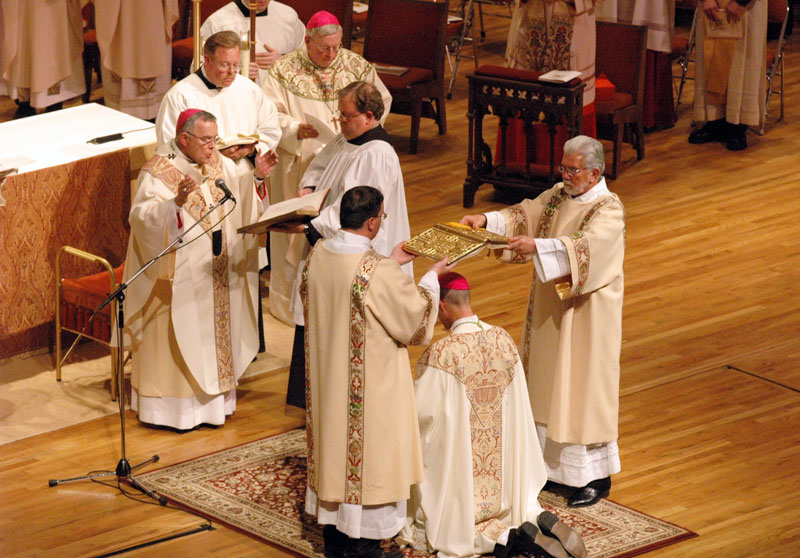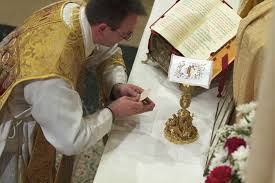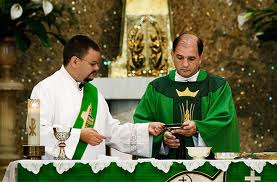Category Uncategorized
Holy Orders
The Sacraments – Holy Orders
There are three degrees of ordination: the episcopate (bishop), the presbyterate (priest), and the diaconate (deacon). There are particular duties that belong to each one of the degrees and only a bishop can ordain.

The Church confers the sacrament of holy orders only on baptised men whose suitability for the exercise of the ministry has been duly recognized. Church authority alone has the responsibility and right to call someone to receive the sacrament of holy orders.
The essential rite of the sacrament of holy orders for all three degrees consists in the bishop’s laying of hands on the head of the candidate and in the bishop’s specific consecratory prayer asking God for the outpouring of the Holy Spirit and his gifts proper to the ministry to which the candidate is being ordained.
Bishops
 Bishops are priests who have been appointed by the Pope, the Bishop of Rome, to be the head of a particular diocese. Bishops are regarded as transmitters of the unbroken apostolic succession going back to the beginning of the Church.
Bishops are priests who have been appointed by the Pope, the Bishop of Rome, to be the head of a particular diocese. Bishops are regarded as transmitters of the unbroken apostolic succession going back to the beginning of the Church.
The consecration of a new bishop requires the participation of several bishops.
Priests
 Priests depend on their bishops in the exercise of their pastoral functions – they are called to be the bishops’ prudent co-workers. They receive from the bishop the charge of a parish community or some other office within the diocese.
Priests depend on their bishops in the exercise of their pastoral functions – they are called to be the bishops’ prudent co-workers. They receive from the bishop the charge of a parish community or some other office within the diocese.
The promise of obedience they make to the bishop at the moment of ordination and the kiss of peace from him at the end of the ordination liturgy mean that the bishop considers them his co-workers, his sons, his brothers and his friends, and that they in return owe him love and obedience. The sacrament of holy orders for the priesthood is normally conferred only on candidates who are ready to embrace celibacy freely and who publicly manifest their intention of staying celibate.
Priests can administer all of the sacraments except holy orders although a bishop normally administers confirmation.
Deacons
 The transitional diaconate is a temporary stage which a man passes through on his way to be ordained to the priesthood. Normally, a transitional deacon is ordained as a priest after six months.
The transitional diaconate is a temporary stage which a man passes through on his way to be ordained to the priesthood. Normally, a transitional deacon is ordained as a priest after six months.
Permanent deacons are ministers ordained for tasks of service of the Church; they do not receive the ministerial priesthood, but ordination confers on them important functions in the ministry of the word, divine worship, pastoral governance, and the service of charity – tasks which they must carry out under the pastoral authority of their bishop.
The permanent diaconate is made up of men (who may be married) who can perform baptisms, witness Catholic marriages, assist at burials and the Mass (without consecrating the bread and wine), and deliver sermons and instruction.
As part of a process of renewal of ministries in the Church, both lay and ordained, the Second Vatican Council decided to restore the diaconate as a distinct ministry and the Irish bishops have now established the permanent diaconate in their dioceses.
In 2006 the Irish bishops produced a booklet on the permanent diaconate which may be seen HERE.
The Irish bishops’ website also has some official information regarding the permanent diaconate in Ireland. You can see it HERE.
